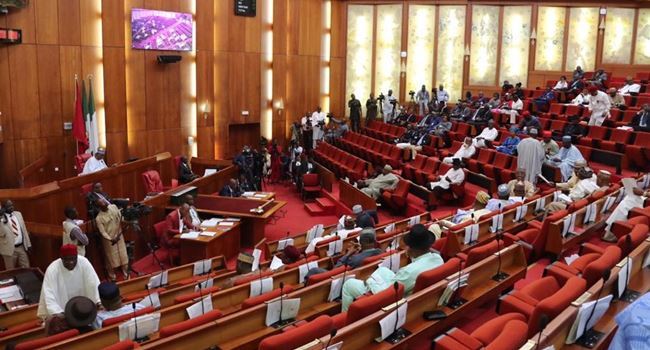
The Senate on Wednesday debated two critical bills – the Sexual Harassment Bill and President Muhammadu Buhari’s Finance Bill, 2019.
The bills, which scaled second reading on the floor of the Senate, were sponsored by the Deputy Senate President, Ovie Omo-Agege and Senate Leader, Abdullahi Yahaya, respectively.
The proposed legislation titled “A Bill for an Act to Prevent, Prohibit and Redress Sexual Harassment of Students in Tertiary Educational Institutions and for other matters connected therewith 2019” has 27 clauses.
According to a statement signed by the Special Assistant (Press) to President of the Senate, Ezrel Tabiowo, the bill proposes up to 14 years jail term, with a minimum of five years, without an option of fine for any educator who commits sexual offences in tertiary institutions.
It defines sexual offences as including: sexual intercourse with a student or demands for sex from a student or a prospective student or intimidating or creating a hostile or offensive environment for the student by soliciting for sex or making sexual advances.
Other forms of sexual harassment identified in the bill are grabbing, hugging, kissing, rubbing, stroking, touching, pinching the breasts or hair or lips or hips or buttocks or any other sensual part of the body of a student; or sending by hand or courier or electronic or any other means naked or sexually explicit pictures or videos or sex related objects to a student, and whistling or winking at a student or screaming, exclaiming, joking or making sexually complimentary or uncomplimentary remarks about a student’s physique or stalking a student.
Senator Omo-Agege, in his lead debate, said: “the most effective way to deal with the offence of sexual harassment in our tertiary institutions is to penalise the very impropriety of the act, with or without consent.”
According to him, sexual harassment must be defined in tertiary educational institutions as statutory rape with strict liability for offenders to be prosecuted easily.
On the extension of the bill to primary, secondary schools, worship centres and work place, Omo-Agege said doing so will not be necessary because the Criminal and Penal codes already adequately deals with these categories with sufficient clarity.
He, however, stressed that the bill prescribes expulsion for students who falsely accuse educators of sexual harassment.
He said, “An educator whose character is maligned is at liberty to sue for defamation under the law of defamation which is well-settled in our jurisprudence and needs no duplication in this bill.”
The Senate also on Wednesday considered President Muhammadu Buhari’s Finance Bill, 2019.
Leading debate on the bill, Senator Yahaya Abdullahi (APC, Kebbi North), said the bill essentially seeks to promote fiscal equity by mitigating instances of regressive taxation; reforming domestic laws to align with global best practices; and introducing tax incentives for investments in infrastructure and capital markets.
Rice, a staple for Christmas celebrations in Nigeria, has become a luxury this year. Soaring…
Panic erupted on Saturday at a concert in Lagos when the stage collapsed during Odumodublvck’s…
The Federal Government of Nigeria has allocated ₦6,364,181,224 billion for the refurbishment and rehabilitation of…
The black market dollar to naira exchange rate for today, 22nd December 2024, can be…
The Nigerian National Petroleum Company Limited (NNPCL) has refuted claims that the 60,000 barrels per…
Manchester City finds itself in unprecedented turmoil, with relegation-level form showing little sign of improvement.…